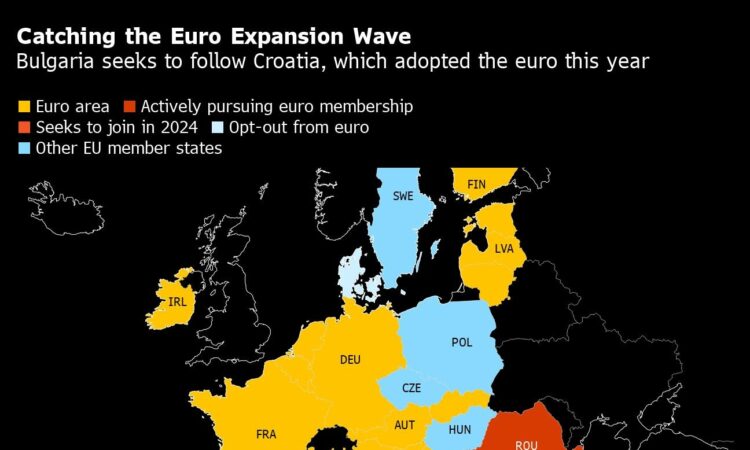
1. Why does Bulgaria want to join the euro?
Bulgaria started working for euro membership soon after it joined the EU in 2007 — as required under its accession treaty. But it put that on hold three years later amid the European sovereign debt crisis, which nearly bankrupted neighboring Greece and some other euro-area countries. In a renewed push since 2016, the government in Sofia has said that adopting the single currency will help the Balkan country avoid being sidelined in the bloc’s decision-making process and further integrate its export-oriented economy.
2. What’s the economic logic?
Since a hyperinflation crisis in the 1990s, Bulgaria has operated under a currency board arrangement that ties the lev to the euro. With little room for independent monetary policy, the country is reliant on the decisions of the European Central Bank. The government and the central bank have argued that adopting the euro will reduce transaction costs, lower interest rates and improve Bulgaria’s credit rating, making it more attractive for investors. It will also help the tourism industry, which contributes more than 12% of the country’s economic output, in part by eliminating the need for many visitors to change currencies.
3. Are there opposing views?
The idea has faced skepticism from some political parties, including the Russia-friendly Socialists, who have insisted on further cost-benefit analysis before setting a firm date. The nationalist Revival party, which is also pro-Russian, has called for a referendum on the topic, claiming that Bulgaria is giving away too much sovereignty. In addition, some analysts, including a deputy central bank governor, have warned against the structural problems of the euro area and the high debt levels of some of its members and criticized some of the ECB’s past policies.
4. What’s the public mood?
A November poll showed that only a third of Bulgarians approved of adopting the single currency. More than two-thirds said they were afraid it will lead to higher prices. Several hundred people gathered in early December in Sofia at a protest against the euro organized by the Revival party. Such doubts aren’t unusual for new members: In Latvia, for instance, half the population opposed the switch when the country joined the euro in 2014.
5. What has Bulgaria done to prepare?
Seen as the EU’s most corrupt state in a ranking by Transparency International, Bulgaria has faced plenty of skepticism from other euro countries — especially after the Greek debt crisis and money-laundering scandals involving banks in the Baltics exposed the risks of letting new members into the club. After a domestic banking crisis in 2014, Bulgaria strengthened its financial supervision to be able to join the EU’s banking union along with the exchange-rate mechanism, known as ERM-2. Lawmakers also updated the legal framework governing the Bulgarian central bank after the ECB pointed to a list of shortcomings. For years, Bulgaria has kept its budget deficit and its debt level well within the EU requirements.
6. What’s still left to do?
The country needs to adopt three bills concerning insolvency, money laundering and insurance. An ongoing political crisis is hindering the process, however, as Bulgaria is heading to its fifth general election in less than two years. In addition, it may have a hard time meeting the criteria on inflation, with Finance Minister Rositsa Velkova, calling the requirement the “only serious challenge” in an interview published in late January.
7. What are the chances?
The tight timetable and deepening political division mean Bulgaria is facing an uphill battle, despite the overwhelming parliamentary majority in support of the euro. President Rumen Radev, who ran as an independent, has seen six attempts to form a government fail since July 2022; He’s scheduled a snap vote for April 2. Central Bank Governor Dimitar Radev has warned the country needs a stable government to show clear political engagement. To meet the Jan. 1, 2024, target date, Bulgaria has to ask the ECB for a report on its preparedness “at the beginning of spring at the latest,” according to Velkova, yet it will only do so if it’s ready, she said. Authorities will need several months to prepare for the actual rollout of the new currency.
8. Who else wants to join the euro area?
Romania has expressed an interest, though it no longer has an official target date. While all EU member states are obliged to join the euro area, Poland, the Czech Republic and Hungary are reluctant to make formal steps, saying that independent monetary policy is vital for them, especially during economic crises such as the current inflation surge. Sweden and Denmark — which secured an opt-out before the dawn of the currency — aren’t budging either.
–With assistance from Peter Laca, Andra Timu, Aaron Eglitis and Zoe Schneeweiss.
More stories like this are available on bloomberg.com



